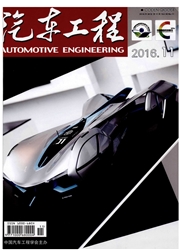

 中文摘要:
中文摘要:
发动机协调控制是提高变速器换挡品质的重要技术手段。本文针对由DEUTZ BF4M1013单体泵柴油机和AllisonS2000液力自动变速器组成的动力传动系统,制定了换挡过程发动机协调控制策略,并与断油控制进行了台架对比试验。结果表明:单体泵柴油机的转矩响应能满足换挡过程协调控制的要求;发动机断油控制虽然显著地减小了换挡过程的滑摩功和正向冲击度,但是在换挡结束时产生了更严重的反向冲击度;而基于转矩的发动机协调控制不仅有效地减小了换挡过程的正向冲击度和反向冲击度,而且有效地减少了滑摩功,提高了换挡品质。
 英文摘要:
英文摘要:
Engine coordinated control is an important technical means to improve the shift quality of transmission. In this paper, an engine coordinated control strategy in shifting process is proposed for the powertrain system composed of DEUTZ BF4M1013 unit pump diesel engine and Allison $2000 automatic transmission, and a comparative test against fuel-cutoff control is conducted. The results show that the torque response of diesel engine with unit pump can meet the requirements of coordinated control of shifting process. Though fuel cut-off control can significantly reduce the sliding friction work and positive shift jerk in shifting process, but it causes larger negative shift jerk at the end of shifting process, while the torque based engine coordinated control can not only reduce sliding friction work, but also effectively lower both positive and negative shift jerks.
 同期刊论文项目
同期刊论文项目
 同项目期刊论文
同项目期刊论文
 期刊信息
期刊信息
